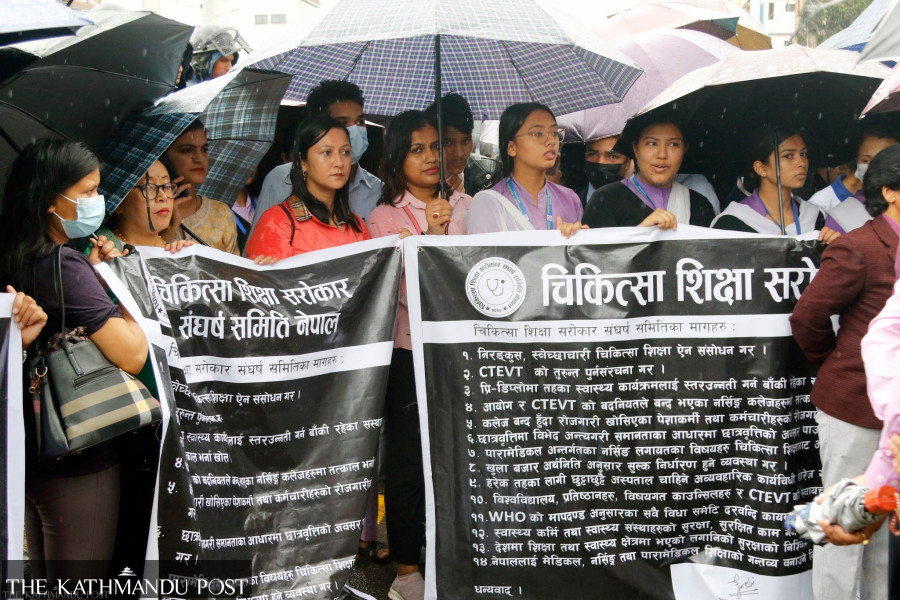National
House panel to settle Medical Commission-CTEVT row
Hundreds of students are deprived of mid-level medical education due to a tussle between the two government entities.
Binod Ghimire
Amid a deepening jurisdiction row between the Medical Commission and the Council for Technical Education and Vocational Training (CTEVT), a House committee has intervened to find a solution after a detailed study.
The Education, Health and Information Technology Committee of the House of Representatives, after two days of discussion, decided to constitute a sub-panel to study the matter and recommend ways to resolve it. A meeting of the parliamentary committee on Monday will form the panel, giving it two weeks to make recommendations.
“The six-member panel of lawmakers will study existing legal provisions and interact with experts before recommending the solution,” Nirmala Devi Lamichhane, the committee secretary, told the Post. “It might recommend revision of Acts.”
Nursing and other non-university medical education providers accuse the Medical Education Commission of wrongly interpreting its Act in order to force them to halt their services. They claim that the Medical Education Act authorises the commission to oversee only university education, not the institutions affiliated with the CTEVT. However, the commission maintains that it enjoys the authority to supervise all institutions providing medical education, no matter who they are affiliated to.
United under the umbrella of the Medical Education Concern and Struggle Committee, medical education providers have been staging protests almost every day for over a month now.
Clause 11 of the Medical Education Act envisions that each college teaching nursing and dental courses must establish a 100-bed hospital. Those offering medical courses of the CTEVT argue that the provision applies only to the colleges providing university education, but the commission hasn’t budged. The CTEVT has also been blaming the commission for breaching its jurisdiction.
During their interactions in the House committee on Thursday and Friday, lawmakers across party lines said it was too late to find a solution as hundreds of students have been deprived of mid-level medical education due to a tussle between the two government entities. Diploma, proficiency certificate-level and university medical education courses are offered in Nepal.
CPN (Maoist Centre) lawmaker and former education minister Devendra Poudel said the Medical Commission has been rather rigid.
“The commission was unbudging even at the time of Covid pandemic. It has always attacked medical education providers,” said Poudel, suggesting an amendment in the Medical Education Act, if necessary.
The commission, in 2018, had given nursing colleges two years to build their own hospitals. But the colleges couldn't do so. As a result, the commission stopped them from admitting new students. It’s not only the institutions under the CTEVT that lack their own hospitals; even the nursing colleges affiliated with the universities do not have them. Some institutions, however, already have hospitals in operation.
Nirmal Sapkota, general secretary of the Forum for Health and Technical Sciences who coordinates the struggle committee, told the House panel that their colleges don’t come under the commission's jurisdiction because the Medical Education Act doesn’t replace the Council for Technical Education and Vocational Training Act.
He also blamed the commission for overstepping its jurisdiction and forcing the colleges without their own hospitals to halt services. The educators say as many as 228 colleges, including 136 offering pre-diploma health education, 73 providing diploma-level staff nurse courses and 18 colleges providing bachelor in nursing and bachelor in nursing science, have ceased their operations due to the commission's decision. This puts their investments worth Rs15 billion at risk, they claim.
As per a report of the Forum for Health and Technical Science, around 4,000 students would enrol in nursing courses until 2021, but now only 1,200 seats are available for such courses, which is a decline of 2,800. Though over 10,000 students sit for entrance exams, most are unable to study the courses of their choice in the country.
“The commission’s decision is forcing students to go to neighbouring India where dozens of colleges have been set up targeting our students,” said Sapkota.
Until the commission’s intervention, the institutions were partnering with hospitals, mainly government-run, for practical training of their students.
Presenting their concerns before the parliamentary committee, the education providers said nursing education providers can't set up their own hospitals because doing so will cost them at least a billion rupees and operation costs are high. They argue that drawing a sufficient flow of patients will be a challenge even if they establish their own hospitals.
The commission, however, doesn’t buy the claim. Its vice-chair Dr Shree Krishna Giri said the commission’s Act supersedes other laws. “The commission was formed to maintain quality in medical education—university or non-university,” he told the House committee. “It is a universal practice for the institutions offering medical education to own a hospital.”




 9.7°C Kathmandu
9.7°C Kathmandu














